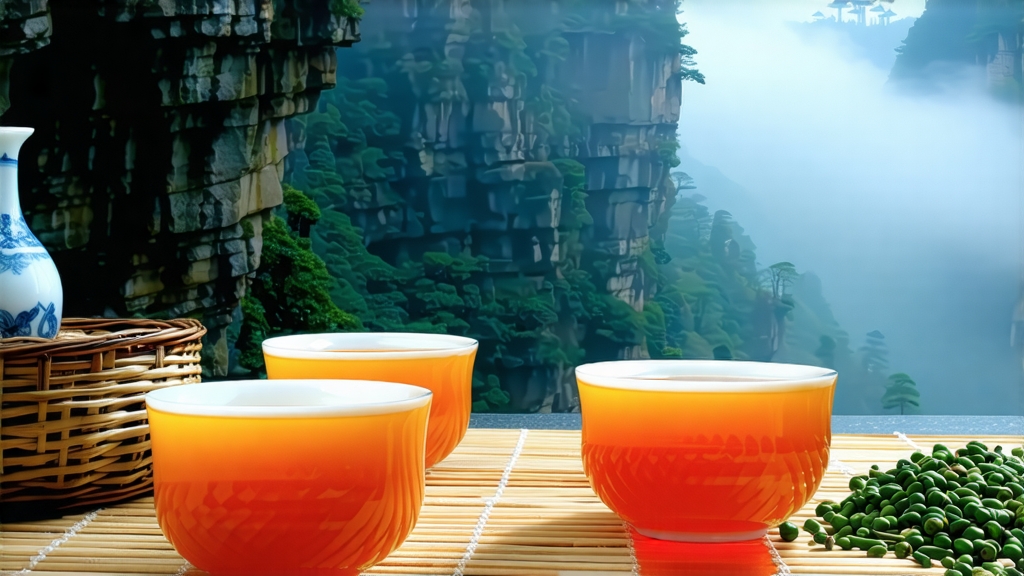
If green tea is China’s springtime and pu-erh its autumn, then Da Hong Pao is the twilight hour when granite peaks glow crimson and every leaf seems to remember the Ming dynasty. Known in the West as “Big Red Robe,” this most mythic of oolongs grows on almost vertical cliffs inside the Wuyi Mountains of northern Fujian, where mineral-rich mists rise from the Jiuqu (“Nine-Bend”) River and etch their signature “rock rhyme”—yan yun—into every cup. To taste authentic Da Hong Pao is to sip the sound of stones, the perfume of orchards that never were, and the memory of scholars who once climbed these slopes with nothing but a flute and a thirst for transcendence.
History: From Imperial Robe to Global Icon
The legend begins in the late Ming, when a scholar on his way to the capital examinations fell ill at the foot of Tianxin Cliff. Monks from the nearby Wuyi Temple brewed leaves picked from four stunted bushes clinging to a fissure; the candidate recovered, passed the exams, and returned in crimson robes to drape the bushes in gratitude—hence “Big Red Robe.” By the Qing, tribute quantities were so prized that armed guards escorted each leaf to Beijing. In 1985, cuttings from the original mother trees (now 350 years old and protected by UNESCO) were successfully propagated, giving the world “pure-clone” Da Hong Pao while the originals survive on a cliff so steep that even monkeys refuse the harvest. Today, the name is both a protected geographical indication (PGI) and a poetic umbrella for a family of related Wuyi rock teas, yet true connoisseurs still chase the mineral whisper that only the original terroir can deliver.
Terroir: Where Stone Learns to Breathe
Wuyi’s danxia landform—purple-red sandstone and tuff compressed 100 million years ago—cracks into narrow terraces that hold just a fistful of acidic, fast-draining soil. Daytime cliff-face temperatures can swing 15 °C within hours, forcing the tea to thicken its cell walls and concentrate aromatic oils. At night, dew condenses on the river below and climbs the rocks like invisible tide, feeding the roots with dissolved calcium, potassium, and rare earth elements. The result is a liquor that carries the literal taste of stone: a tactile sensation Chinese tasters call “bone,” a structure that lets flavor linger like struck bell-bronze.
Varieties: A Spectrum within a Spectrum
- Mother-Tree Da Hong Pao: Harvesting has been banned since 2006; less than 20 g exist in private collections. When brewed, it releases aromas of old sandalwood and dried longan, finishing with a cool menthol note that drifts up the sinus like a mountain breeze.
- Pure-Clone (Qidan): Grafted directly from the mother trees, cultivated in the same micro-valleys. It keeps the cliff-born minerality but adds a brighter apricot top note.
- Blended Da Hong Pao (Shuixian-Base): Craftsmen marry qidan cuttings with high-grade Shui Xian or Rou Gui to recreate the mother-tree profile at accessible prices. The best blends are iterative recipes passed down within families, adjusted for each year’s weather.
- Commercial “DHP Flavor”: Roasted Tieguanyin or even Yunnan large-leaf may be baked and rebranded; these lack yan yun and fade after three infusions, serving as entry-level introductions rather than authentic rock tea.
Craft: The Dance of Fire and Time
Plucking occurs only in late April, when three half-open leaves form a “small open face.” The bushes are too scattered for machines, so pickers rappel or climb bamboo ladders, dropping leaves into wicker baskets lined with fresh banana leaves to prevent bruising.
Withering happens in three stages: sun-withering on bamboo screens for 20 minutes, indoor cooling on water-heated troughs, then a unique “rock-wind” withering where leaves are laid on slate slabs at dusk to absorb radiated cliff heat. Oxidation is pushed to 40–50 %, the outer leaf edges redden while the veins stay jade green—the “green belly with red skirt” hallmark.
The most critical step is charcoal roasting in squat, egg-shaped baskets called longbei. For traditional grade, roasters burn local hardwood charcoal